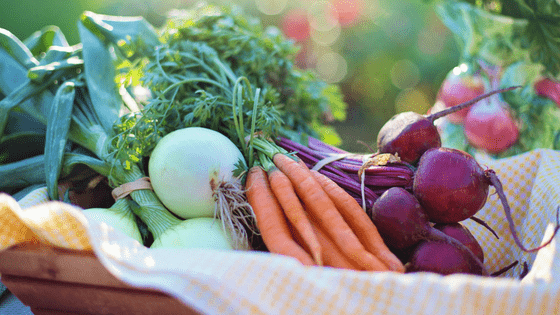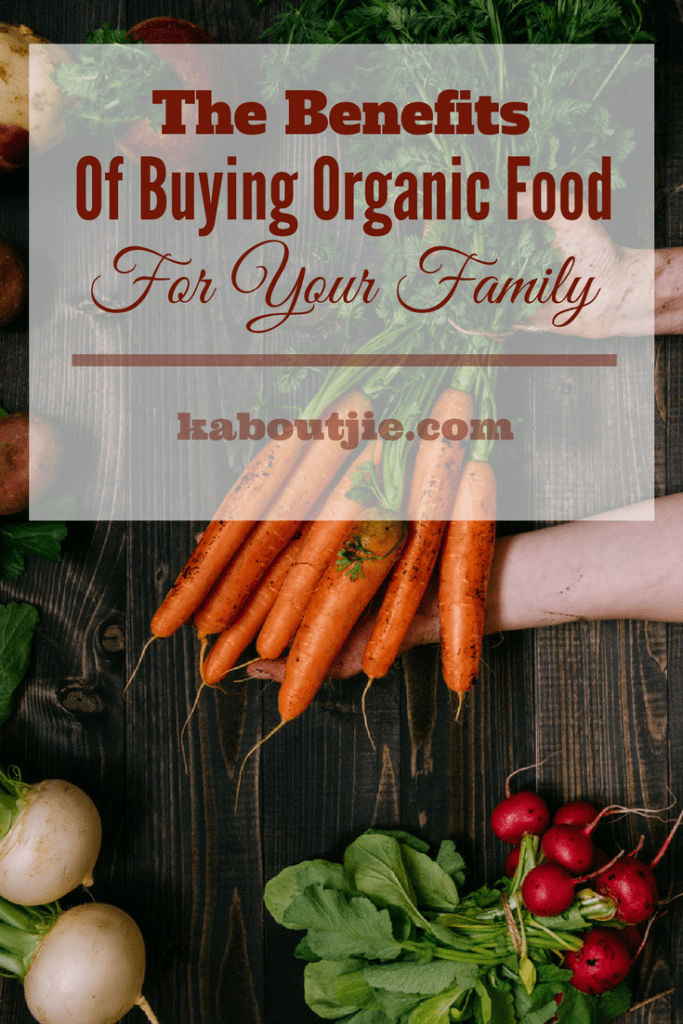Without a doubt you must have come across moms that swear by buying organic food and won’t feed their family anything but organic. So what’s with the hype and is there anything to it?
Organic food is simply food that has been grown without using any pesticides, man-made fertilizers, livestock feed additives, growth regulators or genetically modified organisms (GMO’s).
Here’s what you need to know about organic food and the benefits of buying organic food for your family.
Organic Food Is Safer and Healthier
There is no proof that organic food is more nutritious than conventional food. However one thing that can’t be disputed is that organic food is safer to eat and will lead to you being in better health and able to absorb more healthy nutrients from your food.
Having food that is free from all those dangerous hormones and pesticides is sure to be beneficial to your health. Pesticides are poison, they have been created to kill insects and diseases!
Pesticides have been linked to some of the serious health issues we face – cancer, Alzheimer’s disease, diabetes, Parkinson’s disease, endocrine disruption, birth defects, asthma, learning and developmental disorders, and reproductive and sexual dysfunction.
Consider the fact that your baby or child is still developing and needs the best possible nutrition to grow and develop – conventional farming methods that make use of pesticides and chemicals clearly is not the best option for a growing child.
Something that is becoming very popular now is organic manure rather than using harmful synthetic fertilizers. This sounds like a much better option for myself and for my family.
Organic Food Is Safer For Future Generations
Research has shown that the chemicals from pesticides and other pollutants cross the placenta making this a real concern for pregnant women and their unborn babies.
There are many studies that have linked birth defects, low birth weight, autism, cancer, disrupted hormone function and neurological and behavioral problems.
As mentioned already pesticides have been linked to infertility problems in men and women.
If you want to increase your chances of falling pregnant and of having a healthy baby then going for organic foods is certainly a great choice to make.
Organic Food Protects Animals, the Water and the Environment
By buying organic food you are choosing to support organic farming methods that protect the environment. While this may not have a direct impact on you or your family right at this minute take a moment to think about the complete picture.
Organic food keeps our water clean. When pesticides and other chemicals are used they are not just limited to the farm they are used on. Water run off from farms that make use of pesticides spreads these pollutants into lakes, dams, rivers and the ocean.
Organic farms do not pollute the water, keeping out water safe.
To take this even further pesticides that are in our water affect the world’s wild life – fish, animals and birds all suffer from this.
While organic farming is focused more around the way that animals are fed and the medical treatment that they receive studies have shown that livestock from organic farming are more likely to be treated better.
Organic Farming Uses Less Fossil Fuels
Organic farming conserves fossil fuels due to the fact that organic farming uses less fossil fuels that conventional farming does. Organic farming uses 30 less water and energy for the same amount of produce as conventional farming.
Using fewer non-renewable resources will save money and reduce global warming. Organic farming is a more sustainable farming method.
Organic Produce Is Tastier
Organic produce tastes real and natural due to the fact that there are no artificial preservatives added to the food to keep it fresher for longer. Organic food does not sit on the shelf as long which means you will get a fresher product with a much better taste.
Organic Food Is More Cost Effective
Organic farming is more labor intensive. Yes, it is true that organic food on the face of it is more expensive however if you are comparing the cost of apples, an apple from an organic farm and an apple from a conventional farm are not the same thing.
We are talking about your long term health and the health of your children. Is eating a “cheaper” apple from a conventional farm really going to save you money long term when you consider the possible health problems this could cause your children or yourself? We are talking about the health of the planet for your children and grandchildren to enjoy many years down the line. That is a bit hard to put a price tag on isn’t it?
Organic produce is getting cheaper as the demand for it grows and businesses are trying to meet the need and come out with better prices. The more everyone chooses to buy organic the more the market will cater for it.
Conclusion
Considering all of the above facts it is hard to ignore the benefits of buying organic food. Organic food is better for you and your family. If you are buying baby food look for food made from organic vegetables or even better consider making your own baby food from organic foods.
Eating organic foods and staying away from conventional farming products as well as processed foods will play a massive role in your health and the health of your children.
Do you buy organic food and what are your challenges to buying organic?
 Kaboutjie SA Mommy Blogs by Lynne Huysamen
Kaboutjie SA Mommy Blogs by Lynne Huysamen








We have our own vegetable garden and yes organic tastes so much better. We have added some fruit trees now. There is nothing better than going to pick your own herbs and vegetables.
That is awesome, Shanyn. I am keen to start my own vegetable garden but have just been so daunted by the prospect of getting started. I would love to know more about how to begin growing organic. Have you created your own compost? This is something that I have read about but am not sure how to do myself. I am hoping to do so, however, because whenever I throw away old peels or leftover food, I feel that it could be put to better use and not wasted. Have you found it easy maintaining a vegetable and fruit garden? Your approach is definitely one way that going organic could be made much more affordable!
The planning is involved as planting certain things together are good and certain things aren’t. Google companion gardening. The things we will use often like herbs and tomatoes are planted in front of my kitchen, so it is easy to get to.
We water in the morning and then early evening as it is way to hot and humid in the afternoon. We have a black bin where we have grass cuttings and peels. We give it a turn once in a while and it works wonders. I don’t do the left over food as I do have dogs and it might attract too many flies.
My two oldest boys (8 and 6 years old) wanted their own garden so we got some hollow blocks, put them in a square and they planted in the holes of the blocks. The centre is then used for compost. The look after it themselves.
I think the best is to start small and plant that is easy to maintain. Once you get into it and see the fruits of your labour you will see how much bigger your garden will get. I love it and you will find how different the food tastes.
Wow, I didn’t know there was something like “organic manure”. I just automatically assumed that manure/fertilizer was organic! Just shows you how clueless one can be. This article is very close to my beliefs and it really pulls on my heart strings. I have tried the organic way with my family but like the articles suggests that in the long run it is a way of saving costs in the long run in terms of your family’s health and well-being. However, it is costly! But with better planning I’m sure it doesn’t have to cost an arm and a leg. To get you and your family well on your way to going the organic way is to do your research! You can’t just wake up one day and decide to go organic you have to work out a plan and tackle it from there. It would be a good idea to start growing your own veggies/herbs/fruit as well. Even baking your own bread will be a good thing. A few months ago we started our own patch garden but our new dog destroyed all our efforts and it became such a hassle that I’ve given up. Even though the area was cordoned off she managed to get in. Later to also discover that onions are poisonous for dogs and that just made me give up. The patch became her little playground to dig and get dirty! What a mess she made but that’s another story for another day. I am well on my way in starting my own garden again. That will be my first step to converting my family to organic living. Ps: it is really difficult to find organic shops unless you go up country… you can’t really trust the local market…. any places you know of in the Cape Town area?
Organic food is the best for babies. When my son was born and finally I could start him with solids, as much as I wished I could prepare all his meals at home, being a working mother its impossible.
I had tried two different brands of food, Olli and Hipp. My boy enjoyed either of them. I have never experienced any problems with the organic brands baby food. I do recall purchasing puree in a tube packet with a cap, this was also organic but I cant remember the name of it. In comparison to the price of non-organic food, such as Purity, there is not much difference in the cost of the products.
The organic brands are not sold at all the grocery stores. Bigger grocery stores usually carry the bulk of the organic products.
Organic is best for all of us. My four year old wanted to start a garden of flowers but I only had beggie/herbs seeds. We now only eat spinach, carrots, celery and basil from her garden…and she makes sure we use her veggies in the cooking. We have started more seeds and hope they grow well as it would save a lot of money and shopping.
For compost we dug a hole in the back of the garden and we fill it with peels or scraps from juices we make. The garden is not difficult to maintain except for alot of weeds during the raining season.